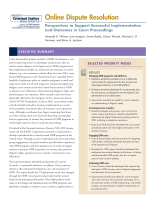Financial institutions
Carjacking: A Descriptive Analysis of Carjacking in Four States, Preliminary Report
WASHINGTON STATE DEFENDER ASSISTANCE PROGRAM: AN EVALUATION
White Collar Crime and Criminal Careers
Understanding the Impact of COVID-19 on Victim Services
The COVID-19 pandemic had a detrimental impact on communities across the nation and significantly affected various aspects of individuals’ lives. One of the negative impacts was an increase in gender-based violence accompanied by shifting barriers to accessing services and support. Victims and victim service providers faced various challenges dealing with the increase in need for services, navigating barriers to help-seeking, and addressing logistical issues.
See the YouTube Terms of Service and Google Privacy Policy
Interpretation of Audio Forensic Information from the Shooting of Journalist Shireen Abu Akleh
Examining the Geographic Distribution of Victim Nations in Stolen Data Markets
Survivability versus rate of recovery for skeletal elements in forensic anthropology
Economic Justice for Survivors of Intimate Partner Violence
See the YouTube Terms of Service and Google Privacy Policy
Stopping Credit Card Thieves
Towards fire forensic characteristics of failed cylindrical format lithium-ion batteries and packages
Thermal Runaway Behavior of Nickel-manganese-cobalt 18650 Lithium-ion Cells Induced by Internal and External Heating Failures
Improving identification of unknown American Indians and Hispanic/Latinx Americans
NIJ-Funded Research on Firearms Violence in Urban Cities Advancing Scientific Evidence to Inform Practice
In this full thematic panel, renowned experts will present a series of papers summarizing the newest findings of NIJ-funded research projects on criminal offenses with firearms in urban areas. Researchers used various criminological and other theories, including routine activity theory, socio-ecological and socio-environmental perspectives, and advanced mixed-study methods, including surveys and spatio-temporal designs, to produce scientific evidence to inform practice.
See the YouTube Terms of Service and Google Privacy Policy
Online Dispute Resolution: Perspectives to Support Successful Implementation and Outcomes in Court Proceedings
Overcoming School Safety Intervention Implementation Challenges - Breakout Session, NIJ Virtual Conference on School Safety
On February 16-18, 2021, the National Institute of Justice hosted the Virtual Conference on School Safety: Bridging Research to Practice to Safeguard Our Schools. This video includes the following presentations:
See the YouTube Terms of Service and Google Privacy Policy
Terrorism Research Before and After 9/11
The tragedy of 9/11 posed unprecedented challenges to forensic science, social science, and physical science and technology — the three bedrock sciences at NIJ. Recovering from the attack and preventing another one have became topmost priorities in the 10 years since the attack. As we approach the 10th anniversary, Gary LaFree discusses how that fateful day impacted social scientific priorities and the outcomes from those changes.
See the YouTube Terms of Service and Google Privacy Policy



